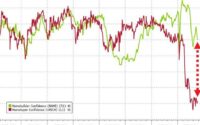Does Terrible Monetary Policy Ever Become Criminal Negligence?
The genesis of this article started last week when I found myself writing about Janet Yellen’s decade plus of continued incompetence when it comes to both monetary and fiscal policy.
The piece evolved over the last couple of days when I found a video on Twitter of Yellen, President Biden, press secretary Jen Psaki and numerous other highly qualified economic experts talking about inflation being transitory with a certainty that can only be described as “fully assured”.
My visceral reaction to the video was to make the comment I posted in my tweet: how could it not be criminal to be this wrong, when so much hangs in the balance?
I went for an 8 mile run this past weekend and spent the hour, as I often do, replaying in my head all of the downright incorrect statements that people in positions of economic power have made over the last decade.
The most recent smattering of these downright demonstrably false claims has included:
-
“There’s nothing to suggest a recession is in the works” – Janet Yellen, last week
-
“I wouldn’t do it differently. I was very supportive of the American Rescue Plan.” – Janet Yellen, last week
-
U.S. inflation risk is “small” and “manageable” – Janet Yellen, March 2021
-
“I don’t anticipate that inflation is going to be a problem” – Janet Yellen, May 2021
-
“I don’t think there’s going to be an inflationary problem.” – Janet Yellen, May 2021
-
“In the 1970s, a series of supply shocks became a longer run problem … that partly occurred because policy makers weren’t trusted by the public to deal effectively with inflation. But I certainly see no evidence that that’s the case now.” – Janet Yellen, November 2021
-
The Fed “shouldn’t overreact to ‘temporary’ inflation” – Neel Kashkari, November 2021
-
“There’s nothing that I’m seeing in these fundamental factors that leads me to think that this is a long-term change in inflation or inflation expectations.” – Neel Kashkari, November 2021
-
“If we overreact by saying ‘let’s change the path of monetary policy’…that could lead to a worse long-term outcome for the economy.”- Neel Kashkari, November 2021
-
“What’s the economic theory that a one time boost of fiscal spending, a one time boost of demand – it leads to higher prices, yes – does it lead to higher inflation, which means ongoing year after year after year of continuing price increases. I don’t really understand the mechanism by which Larry Summers thinks this one time fiscal stimulus leads a change in the path of inflation.” – Neel Kashkari, November 2021
-
“The key here is from my perspective as a Central Banker is not to overreact. We want to pay attention to the data, we want to look at the evidence and we want to make our adjustments prudently, not just overreact because Twitter is hyperventilating.” – Neel Kashkari, November 2021
-
“I can’t predict the future any better than Bill Dudley can.” – Neel Kashkari, November 2021
-
“Inflation is higher than I expected, and it’s the high inflation has lasted longer than I expected. We know the US economy is recovering from the COVID shutdown and the downturn. But the recovery is uneven, and demand has recovered more quickly than supply has. So given those facts, it’s not that surprising that inflation is coming up higher than we expected. But it should start to normalize over the course of this year, if a couple things happen: if workers come back into the job market. We’re still missing 3 or 4 million workers. And if supply chains start to sort themselves out, which I hope that they will. But obviously the Federal Reserve has an important role to play and we’re going to do our part.” – Neel Kashkari, January 2022
-
“So that’s why the fact that the yield curve has flattened a lot over the past six months, that’s giving me some indication that we’re probably not that far away from neutral, not as far away as maybe we thought.” – Neel Kashkari, January 2022
-
“So you know, neutral is a concept and so it’s not as if there’s an equation exactly where it is. For me, it’s somewhere between 2 and 2.5 percent.” – Raphael Bostic, May 2022, when CPI rose 8.6%
In the Yellen-centric piece I published last week, I talked about how she was a symptom of a much bigger monetary policy problem. That problem, today, has to be called out for exactly what it is: a willful ignorance of basic economic laws that we cannot micromanage efficiently without exacerbating the much needed “harm”, in the form of checks and balances, that the free market would otherwise provide.
All the while, inflation data and a widening wealth gap continue to prove that the Fed is doing far more harm than good. In addition to brutalizing the economy, economic officials just simply can’t seem to get a damn thing right.
It’s stunning: for the trillions of dollars of resources that they have at their disposal, including access to literally every single human economist that has ever walked the earth, the Fed has displayed what can only be described as a stunningly consistent penchant for getting things dead wrong.
Today’s article is free, but if you have the means and would like to support my work, I’d be humbled to have you as a subscriber:
I spent some time over the last few months writing about how nefarious the Fed’s scheme is, namely because it works as background machinery in the dark of night, if you don’t mind me channeling my inner Ginsburg.
Countless times, I have reminded my readers and listeners that the inflationary “machinery of night” blankets the most regressive tax possible upon the people who can least afford it, and does so in an extraordinarily convenient way for elites, politicians, central bankers and central planners whose titles and “jobs” hinge upon nobody questioning them and/or figuring out how the system works in the first place.
As I noted back in February:
Today, the fabric of our modern banking world is held together by a logical fallacy of a system, wherein central banks are afforded the asinine luxury of being able to print infinite amounts of “money”, which is then disproportionately distributed toward the ruling class, billionaires, and elites, instead of the people who need it the most.
One constant, while the Fed’s plan plays out, is that the consistent widening of the inequality gap as a result of Fed policy hasn’t been easily digestible to the American public.
But as I have predicted, the days of riding that gravy train without the public catching on are over. With inflation at 8.6%, the consequences of monetary policy are hitting American consumers in the most digestible way possible: through the price of gas and consumer staples.
“Inflation pierced 2% a year ago and has been creeping higher every month (sound familiar?) Average citizens were screaming about it on a daily basis – yet policy makers knew better and kept stimulating,” Kenny Polcari said last week.
There’s nowhere to hide the inflation anymore. Consumers are facing it head on and they know it.
So, it feels like a great time to ask the question: looking back on the last decade of Fed policy, combined with the effect it is having today, when does the Fed’s inability to forecast anything correctly or understand inflation become criminal negligence?
The definition of criminal negligence is: “conduct in which a person ignores a known or obvious risk, or disregards the life and safety of others. Federal and state courts describe this behavior as a form of recklessness, where the person acts significantly different than an ordinary person under similar circumstances.”
Has the Fed ignored obvious risks? Have they acted “significantly different” than an ordinary person would in their circumstance?
The Fed’s conduct looks even worse when you understand that it isn’t as though they don’t have access to economists that can make sense of this for them. Many economists from the Austrian school have been predicting that precisely this would happen. Surely, the Fed must have handicapped for their opinions, even in the slightest manner, right?
I mean, let’s be serious. The Fed doesn’t need to appoint Peter Schiff as Fed Chair, but it would do well to welcome consultations from economists at the Mises Institute, distinguished politicians like former Senator Ron Paul and accomplished economists like Peter Schiff, in order to try to get “the other side of the story”.
Not unlike the current political atmosphere in the country, the left-leaning administration and Fed have swung wildly, too far, in the wrong direction. To restore any shred of credibility it may have left and avoid what, to me, appears to be continued gross negligence, the Fed needs to show that it can welcome a balance – considering the Austrian perspective – and get serious about rethinking some of the deepest foundations of how it approaches monetary policy and economics.
If the Fed was a hedge fund and didn’t have access to printing unlimited money, it would have gone under and lost its investors years ago. The fact that it continues to not only function, but be taken seriously, is nothing more than a testament to our country‘s economic ignorance.
It’s even more ridiculous when you consider the fact that economic competence is supposedly the reason the Fed exists.
So, given the above definition, how much further are we willing to accept bald-face lies and gross incompetence before asking serious questions about whether or not the brutalizing inflationary consequences that the middle and lower class are facing right now should be a prompt for rethinking monetary policy? And, more importantly, when do we ask whether or not these lies eventually constitute criminal recklessness?
[ad_2]
Source link


